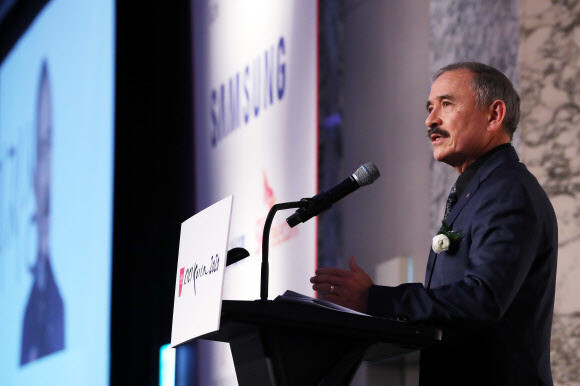hankyoreh
Links to other country sites 다른 나라 사이트 링크
[Editorial] Harris needs to apologize for his presumptuous and arrogant remarks

US ambassador to South Korea Harry Harris said on Jan. 16 that South Korea needs to hold deliberations through its working group with the US “in order to avoid a misunderstanding later that could trigger sanctions.” The ambassador’s remarks were an overt attempt to keep the South Korean government from considering the idea of permitting individual tourism to North Korea. Seoul immediately reacted to Harris’ remarks by declaring that North Korean policy is the sovereign domain of South Korea. However, an even clearer response is demanded, given the high likelihood of the US meddling in the exploration of inter-Korean cooperation projects going forward.
Individual tourism to North Korea is something that South Korean President Moon Jae-in enthusiastically proposed during his New Year’s press conference as one of the key ways of promoting North Korea-US dialogue through inter-Korean cooperation. Since individual tourism doesn’t violate international sanctions, US approval isn’t even required. While South Korea could certainly explain the program to the US and seek its understanding while the program is underway, the US fundamentally doesn’t have the authority to tell South Korea what to do in this matter. For the US ambassador, without even speaking for the American government, to butt into this matter, throwing around tendentious words like “sanctions,” brings on criticism about interference in South Korea’s domestic affairs. Harris needs to apologize to the South Korean public for his presumptuous and arrogant remarks.
Those remarks are only the latest in several instances in which Harris has triggered a backlash from the South Korean government and public by crossing the line in his words and actions. He courted controversy last year with remarks that sided with Japan in a diplomatic spat with South Korea over their General Security of Military Information Agreement (GSOMIA). Harris summoned Lee Hye-hoon, chair of the National Assembly’s Intelligence Committee, to his residence, where he badgered her with the demand for South Korea to raise its defense cost-sharing contribution to US$5 billion. In a meeting with lawmakers from the ruling and opposition parties, he absurdly asked if South Korean President Moon Jae-in is surrounded by leftist North Korean sympathizers. Because of such incidents, Harris already faces savage criticism and doubts about his qualifications as ambassador, and now he’s done it again, making remarks that call into question the autonomy of the South Korean government’s policy toward the North.
If Harris’s remarks were made with the blessing of the American government, we have an even bigger problem. Publicly, at least, the US doesn’t directly oppose Seoul’s efforts to advance inter-Korean cooperation. But in the past, the US has used its diplomatic channels with South Korea to put the brakes on resuming tourism to Mt. Kumgang, and there’s no guarantee that something similar won’t happen again. Seoul needs to stay firm in its pursuit of inter-Korean cooperation programs while simultaneously helping the US understand that improving inter-Korean relations can move North Korea-US dialogue forward as well. And on matters pertaining to South Korean sovereignty, we need to draw a line in the sand against excessive interference by the US.
Please direct comments or questions to [english@hani.co.kr]

Editorial・opinion
![[Column] Season 2 of special prosecutor probe may be coming to Korea soon [Column] Season 2 of special prosecutor probe may be coming to Korea soon](https://flexible.img.hani.co.kr/flexible/normal/500/300/imgdb/original/2024/0426/3317141030699447.jpg) [Column] Season 2 of special prosecutor probe may be coming to Korea soon
[Column] Season 2 of special prosecutor probe may be coming to Korea soon![[Column] Park Geun-hye déjà vu in Yoon Suk-yeol [Column] Park Geun-hye déjà vu in Yoon Suk-yeol](https://flexible.img.hani.co.kr/flexible/normal/500/300/imgdb/original/2024/0424/651713945113788.jpg) [Column] Park Geun-hye déjà vu in Yoon Suk-yeol
[Column] Park Geun-hye déjà vu in Yoon Suk-yeol- [Editorial] New weight of N. Korea’s nuclear threats makes dialogue all the more urgent
- [Guest essay] The real reason Korea’s new right wants to dub Rhee a founding father
- [Column] ‘Choson’: Is it time we start referring to N. Korea in its own terms?
- [Editorial] Japan’s rewriting of history with Korea has gone too far
- [Column] The president’s questionable capacity for dialogue
- [Column] Are chaebol firms just pizza pies for families to divvy up as they please?
- [Column] Has Korea, too, crossed the Rubicon on China?
- [Correspondent’s column] In Japan’s alliance with US, echoes of its past alliances with UK
Most viewed articles
- 1AI is catching up with humans at a ‘shocking’ rate
- 2‘We must say no’: Seoul defense chief on Korean, USFK involvement in hypothetical Taiwan crisis
- 3[Column] Season 2 of special prosecutor probe may be coming to Korea soon
- 4Is Japan about to snatch control of Line messenger from Korea’s Naver?
- 5Korea sees more deaths than births for 52nd consecutive month in February
- 6Amnesty notes ‘erosion’ of freedom of expression in Korea in annual human rights report
- 7[Editorial] Korea’s surprise Q1 growth requires objective assessment, not blind fanfare
- 8Is N. Korea threatening to test nukes in response to possible new US-led sanctions body?
- 9Foreign workers live behind daunting language barrier
- 10Park administration’s distorted history textbooks made public